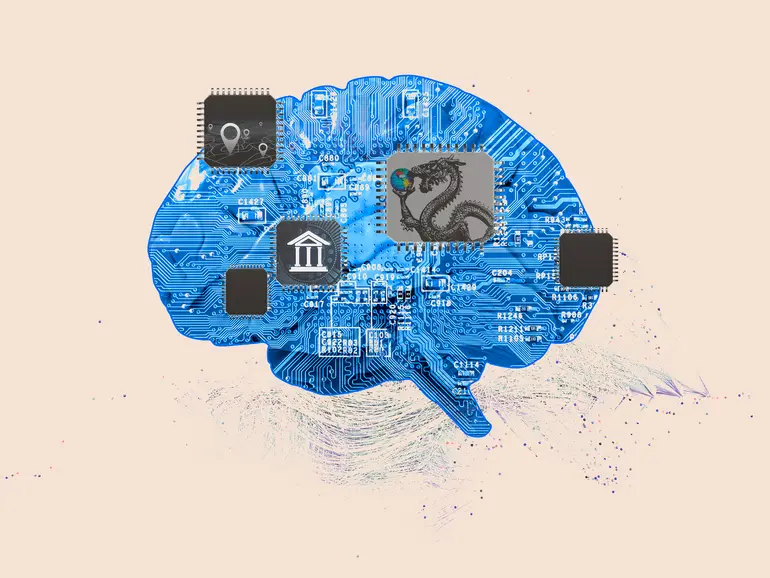AI’s missing ingredient: Shared wisdom
We are in the fourth wave of artificial intelligence. In his new book, Alex Pentland says understanding AI from the 1960s, 1980s, and 2000s can help us develop technology that supports shared wisdom.

Faculty
Alex `Sandy’ Pentland directs MIT’s Human Dynamics Laboratory and the MIT Media Lab Entrepreneurship Program, co-leads the World Economic Forum Big Data and Personal Data initiatives, and is a founding member of the Advisory Boards for Nissan, Motorola Mobility, Telefonica, and a variety of start-up firms. He has previously helped create and direct MIT’s Media Laboratory, the Media Lab Asia laboratories at the Indian Institutes of Technology, and Strong Hospital’s Center for Future Health.
In 2012 Forbes named Sandy one of the `seven most powerful data scientists in the world’, along with Google founders and the CTO of the United States, and in 2013 he won the McKinsey Award from Harvard Business Review. He is among the most-cited computational scientists in the world, and a pioneer in computational social science, organizational engineering, wearable computing(Google Glass), image understanding, and modern biometrics. His research has been featured in Nature, Science, and Harvard Business Review, as well as being the focus of TV features on BBC World, Discover and Science channels. His most recent book is `Honest Signals,' published by MIT Press.
Over the years Sandy has advised more than 50 PhD students. Almost half are now tenured faculty at leading institutions, with another one-quarter leading industry research groups and a final quarter founders of their own companies.
Sandy's research group and entrepreneurship program have spun off more than 30 companies to date, three of which are publicly listed and several that serve millions of poor in Africa and South Asia. Recent spin-offs have been featured in publications such as the Economist and the New York Times, as well as winning a variety of prizes from international development organizations.
Pentland, Alex. Cambridge, MA: MIT Press, 2025.
Aleta, Alberto, David Martín-Corral, Michiel A. Bakker, Ana Pastore y Piontti, Marco Ajelli, Maria Litvinova, Matteo Chinazzi, Natalie E. Dean, M. Elizabeth Halloran, Ira M. Longini Jr, Alex Pentland, Alessandro Vespignani, Yamir Moreno, and Esteban Moro. Proceedings of the National Academy of Sciences Vol. 119, No. 26 (2022): e211218211.
Heroy, Samuel, Isabella Loaiza,Alex Pentland, and Neave O'Clery. Environment and Planning B: Urban Analytics and City Science (2022).
Michiel A. Bakker, Duy Patrick Tu, Krishna P. Gummadi, Alex Pentland, Kush R. Varshney, and Adrian Weller. In Proceedings of the 2021 AAAI/ACM Conference on AI, Ethics, and Society, July 2021.
Adjodah, Dhaval, Karthik Dinakar, Matteo Chinazzi, Samuel P. Fraiberger, Alex Pentland, Samantha Bates, Kyle Staller, Alessandro Vespignani, and Deepak L. Bhatt, MIT Sloan Working Paper 6253-21. Cambridge, MA: MIT Sloan School of Management, 2021.
Lazer, David M.J., Alex Pentland, Duncan J. Watts, Sinan K. Aral, Susan Athey, Noshir Contractor, Deen Freelon, Sandra Gonzalez-Bailon, Gary King, Helen Margetts, Alondra Nelson, Matthew J. Salganik, Markus Strohmaier, Alessandro Vespignani, and Claudia Wagner. Science Vol. 369, No. 6507 (2020): 1060-1062.

We are in the fourth wave of artificial intelligence. In his new book, Alex Pentland says understanding AI from the 1960s, 1980s, and 2000s can help us develop technology that supports shared wisdom.

Using the wrong datasets to train AI models can result in legal risks, bias, or lower-quality models. The Data Provenance Initiative’s tool can help.
Professor Sandy Pentland wrote: "Overall, nations are seeing fast changes in their economies thanks to AI and a changing geopolitical climate. What's emerging is not simply a new set of trade agreements, but a new operating model for sovereignty. The countries that do best won't be those that wait for the next superpower to set the rules; they'll be the ones that deliberately build the rails."
Professor Sandy Pentland said: "A lot of the fundamental problem with AI, and particularly with agents, is their lack of the notion that you would call community. Restoring community is what 'Shared Wisdom' is all about, for people, but also, for agents. Making them safe, making them predictable, so that they do what they're supposed to."
In his recent book "Shared Wisdom," professor Alex Pentland argues that the development of machine learning can help foster cooperation among people. "Shared wisdom is what your community believes," explains Pentland. "It's not necessarily the truth; it simply means saying, 'We all believe this to be true. Now we can act on it.'"
In this podcast episode, professor Alex "Sandy" Pentland discusses his new book "Shared Wisdom: Cultural Evolution in the Age of AI."
This online program from the MIT Sloan School of Management and the MIT Computer Science and Artificial Intelligence Laboratory (CSAIL) challenges common misconceptions surrounding AI and will equip and encourage you to embrace AI as part of a transformative toolkit. With a focus on the organizational and managerial implications of these technologies, rather than on their technical aspects, you’ll leave this course armed with the knowledge and confidence you need to pioneer its successful integration in business.
Machine learning, a branch of artificial intelligence, is the science of programming computers to improve their performance by learning from data. Dramatic progress has been made in the last decade, driving machine learning into the spotlight of conversations surrounding disruptive technology. This six-week online program from the MIT Sloan School of Management and the MIT Computer Science and Artificial Intelligence Laboratory (CSAIL) aims to demystify machine learning for the business professional – offering you a firm, foundational understanding of the advantages, limitations, and scope of machine learning from a management perspective.